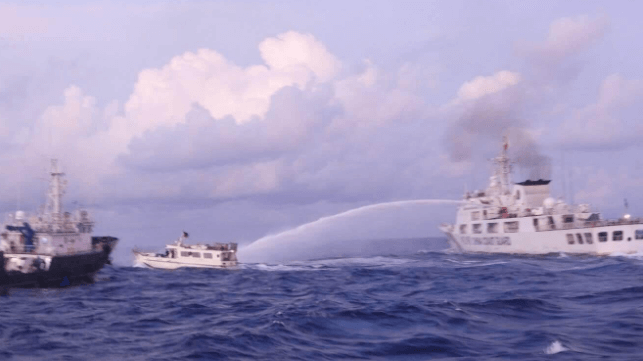Manila May Expel Chinese Ambassador Over China Coast Guard's Behavior

The government of the Philippines summoned the Chinese ambassador to Manila on Monday to complain about aggressive and confrontational behavior by the China Coast Guard. The administration of President Ferdinand Marcos Jr. warned that it may consider expelling the envoy if the tense standoffs continue.
According to foreign ministry spokesperson Teresita Daza, the Malacanang has "seriously considered" the possibility of declaring Chinese ambassador Huang Xilian, who has been in Manila for four years. (It would not be the first time: The municipal council in Kalayaan, Palawan took the initiative of declaring Xilian persona non grata months ago over his support for the China Coast Guard.)
According to the Philippine Coast Guard, China Coast Guard cutters harassed Philippine government vessels at two flash point locations in the South China Sea last weekend. On Saturday, Chinese cutters used water cannons and long range acoustic devices (LRADs, also known as "sound cannons") to deter Philippine Bureau of Fisheries and Aquatic Resources boats from resupplying a small fleet of Philippine fishermen at Scarborough Shoal. On Sunday, a Philippine convoy bound for the outpost on Second Thomas Shoal encountered typical resistance from China Coast Guard cutters, resulting in the collision of the CCG 21556 and supply boat Unaizah Mae 1.
According to the Armed Forces of the Philippines, AFP Chief of Staff General Romeo Brawner Jr. was on the supply boat at the time of the collision. The boat continued onward to the outpost, where Brawner greeted troops and joined in a celebratory meal.
Both Scarborough Shoal and Second Thomas Shoal have seen confrontations between Chinese and Philippine forces for decades. Both sites are in the Philippine EEZ, but China claims sovereignty over the region under its sweeping "nine-dash line" policy. This historically-based claim was dismissed as inconsistent with international law by the Permanent Court of Arbitration in the Hague in 2016.

that matters most
Get the latest maritime news delivered to your inbox daily.
In a statement Monday, a Chinese foreign ministry spokesperson said that the responsibility for the collision "completely lies with the Philippines." China asserts that the Armed Forces of the Philippines should abandon Second Thomas Shoal, and that the Philippine "intrusions" into the Philippine EEZ are an attempt to "permanently occupy" the reef. In this view, the Philippine garrison has "gravely violated China's sovereignty" in waters located 600 nautical miles from China and 100 nautical miles from the Philippines. (The Philippine Coast Guard notes that the shoal is not an island, and therefore ineligible for sovereignty claims by China or any other party under the UN Convention on the Law of the Sea.)
China further claims that U.S. military and diplomatic support for the Philippines has "emboldened" Manila to defend its exclusive economic zone.
